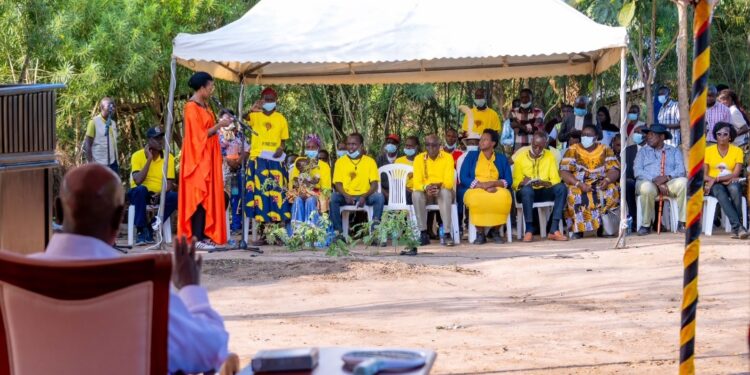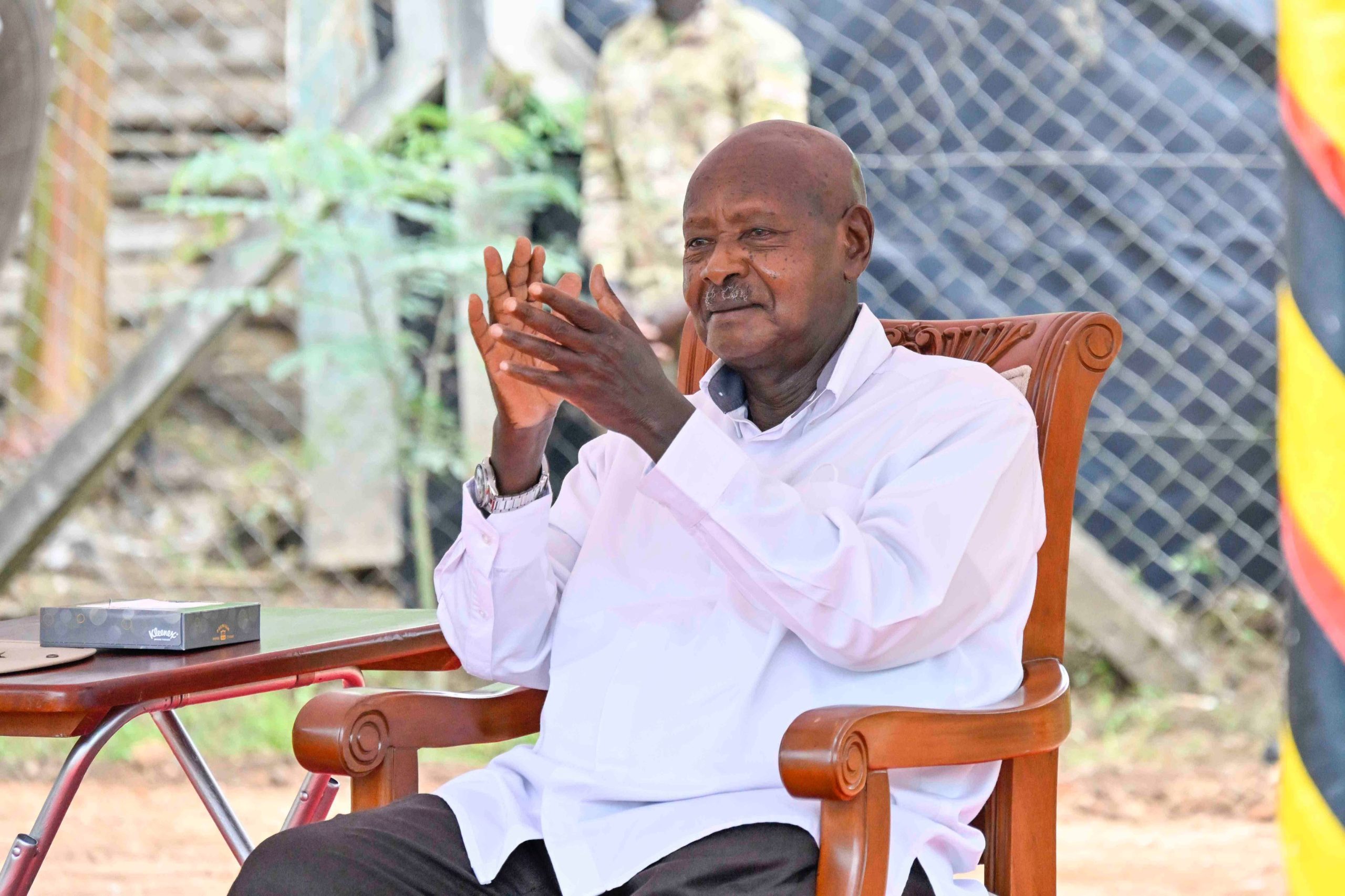
President Yoweri Kaguta Museveni has stated that the government will need to plan for enormous output following the achievement of the Parish Development Model (PDM) in various areas of the country.
“We’re moving along extremely well. The government now needs to plan for enormous production of things like eggs, pigs, and cattle. I’ve already constructed a leather industry for you to handle cow and goat skins. Here in Karamoja, cement factories are being built, and they will eat your meat and milk. We will also be working on the dairy issue. When I was in Bukedi, I noticed folks doing well with local chickens, turkeys, ducks, and fish farming, and all these,” President Museveni said.
The President delivered the remarks in Nakapiripirit on Tuesday, December 3, 2024, after visiting Lokong Emmanuel Losike, a piggery farmer in Kakomokwee Village, Loregae sub-county, Nakapiripirit district.
The President is in Karamoja Sub-Region as part of his performance assessment trip of the PDM, a program designed to raise household incomes and improve Ugandans’ quality of life by bringing subsistence-level households into the money economy.
He praised the Karamojong for giving up cattle rustling in favor of peace and active participation in a program aimed at lifting them out of poverty.
“All of this is possible due of the peace. Because it is ill-advised to believe that stealing will make you wealthy. And you recall our disagreements about that. Some argue that the government cannot disarm Uganda until it disarms the Turkanas, Somalis, and other opponents. I told you this was incorrect thinking. On the western side, we have a problem with Congolese firearms, but Uganda is always tranquil despite the violence in the area. So, I’m delighted you’ve received the message of peace,” the President said.
Mr. Lokong, one of the first beneficiaries of Naturum-Loregae PDM SACCO, earned one million shillings on July 13, 2023 and invested in green beans, which did not return well. He eventually founded a piggery business called Tobongu-Lore, which implies that “those who have run away from home should return because there is life at home compared to other places where you end up being street people and scavenging on garbage dumps.”
“It encourages the youth who have involved themselves in cattle theft and raids to leave such a bad act and join farming for sustainability,” Mr. Lokong explained.
According to the President, the PDM plan was to help people who don’t have any income start earning, and he was pleased to see that the people of Karamoja are now waking up to the program, especially because, as true livestock keepers, fencing off where animals stay protects them from disease.
“But in the first place, you were utilizing the wrong technique by snatching cows without knowing whether they were sick or not. I am a cattle owner. I had a friend in Kotido who gave me a cow many years ago, but I had to check it first since I didn’t want this cow to spread sickness to my cows. So, you can see that you were employing incorrect science, but you are now waking up. And now that I go around, I can see how easy it is for you people to come out of poverty,” the President said, adding that it was a conscious initiative by the government to grant Shs.100 million every parish to assist 100 individuals each year, translating to Shs.500 million benefiting 500 households in five years.
“And after 24 months, the one who received first pays back one million plus something little, and that money stays in your fund here; it does not go back to the government. In 5 years, in addition to Shs500 million, you’ll have an extra Shs300 million recycled inside the parish, which means you’ll be able to support 800 households with both new and recycled funds,” H.E. Museveni stated.
The Story of Emmanuel Lokong:
On July 13, 2023, Mr. Lokong received Shs. 1 million and hired 4 acres of land each for Shs. 70,000 to establish a green gram/bean company.
Mr. Lokong said to the President that he spent Shs. 280,000 to hire the 4 acres of land, Shs. 3000 to buy 50 kg of green gram seeds apiece, totaling Shs. 150,000, Shs. 200,000 to plough the ground, Shs. 200,000 to weed, and Shs. 120,000 to harvest. Shs.50,000 was spent on transportation, and he planned to harvest approximately 2000 kg from the four acres, earning him five million shillings if sold at Shs.2500 per kilogram. However, the actual crop was 1,400 kg, which earned him Shs. 1,700,000 after selling 1000 kilos each for Shs. 1,700. The 400 kg were saved for seed and personal consumption.
Mr. Lokong spent Shs.400,000 of his Shs.1,700,000 on five piglets, each costing Shs.80,000, as well as Shs.700,000 on a plot of ground spanning 100 by 40 meters. He spent the remaining Shs. 600,000 to purchase 20 iron sheets.
When the five piglets grew to 25, Lokong sold five pigs apiece for Shs. 400,000 and used the proceeds to buy more feed and build a pigsty.
“Apparently, I have 22 pigs, including 12 piglets, present, and if I sell the mature ones at Shs. 400,000 each, I can get Shs. 8,800,000,” the president was told by Mr. Lokong.
Lokong lamented issues such as African swine fever, high feed costs, poor housing, a lack of sufficient finance, and limited extension knowledge and skills on the project.
“Although the project is difficult, I will persevere until I reach my aim of being more self-sufficient and changing the status of my area. Thank you, Your Excellency, for initiating the PDM program, which has helped me advance from where I was to where I am now. “I hope the PDM program continues to benefit other youths,” he continued.
Mr. Lokong, 33, has revolutionized his life after adopting the PDM. He previously struggled to support his family of six on a monthly income of Shs. 80,000 from selling sand collected from water streams. He aspires to return to school to finish his diploma in Social Work and Social Administration, which he began at Makerere Business Training Center Moroto Branch after earning a certificate in the same area at the same institution in 2023.
What are other people saying?
According to Mr. Simon Peter Arionga, Nakapiripirit District Veterinary Officer, livestock raising is one of the most profitable industries in Karamoja. He stated that there are 170,000 cow farmers, 883 goat rearers, and 322 piggers, among whom Mr. Lokong is praised for his vision.
“The most important aspects of piggery are feeding, housing, and disease control. I’ve been in constant contact with him, and as you can see, a structure is being built to move the baby pigs and create additional space. As a technical person, I can state that Emmanuel is a farmer with a clear vision for success. We now expect him to start growing maize in order to produce maize brand, which is now sold at Shs. 500 per kilogram,” Mr. Simon Peter said, assuring piggery farmers that there is a ready market for pork not only in the district but throughout the Karamoja subregion and beyond, with traders scouring Mbale, South Sudan, and Kampala for mature pigs to slaughter for pork.
“Recently we have been receiving people from Kampala looking for pigs to slaughter even locally, especially on weekends; it’s a barbecue of pork,” he claimed.
Ms. Loyok Anna Ruth, a resident of Kakomokwee Village, believes that the piggery project is not only the best but also the least dangerous endeavor for Karamoja residents, particularly those beginning out in livestock production, as compared to raising other animals.
“In our area, if you go into the rearing of cows or goats, thieves will come and loot them, leaving you with nothing. Pigs, however, are less likely to be stolen. Furthermore, pigs multiply faster than cows and goats, resulting in speedy income flow,” Ms. Loyok explained.
On the other hand, Ms.Onyang Sarah, a resident of the area, stated that the Parish Development Model would be successful, but that insecurity threatens the effort, since robbers would come to grab your harvest.
Earlier, President Museveni paid visits to Mr. Alir Charles, an onion and carrot farmer in Abim district who specializes in irrigation, and Amos Rhembuss, a goat farmer in Amudat area.
The President previously praised the Parish Development Model program’s implementation in the Teso sub-region.
President Museveni has always emphasized wealth creation during his Parish Development Model tours by employing the four-acre model, in which one acre is used for growing high-value crops such as coffee, another for food for domestic use, a third for growing fruits, and a fourth for growing pasture for dairy cattle, and in the backyard, a farmer raises poultry, pigs, and fish farming for those living near swamps.



